We arrived Friday night after nearly 36 hours of travel. We were tired yet excited about what lay ahead. We spent Saturday getting acclimated to our new culture and excitedly shopping for traditional clothing. That would be the last time that I would leave the area where we were staying until Wednesday. Sunday was church and rest. Monday and Tuesday were full days of teaching and ministering.
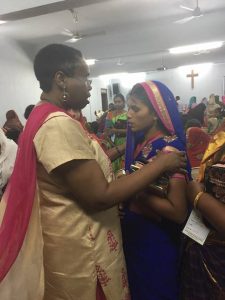 So, on Wednesday, I was excited to get off campus and see more of the countryside. Because my schedule was packed with teaching, I had to choose between going on a medical clinic or a tour of the city. I chose to participate in the medical clinic along with two other women from our group.
So, on Wednesday, I was excited to get off campus and see more of the countryside. Because my schedule was packed with teaching, I had to choose between going on a medical clinic or a tour of the city. I chose to participate in the medical clinic along with two other women from our group.
The three of us – suburban, middle class, American women – piled into our car with a driver and an interpreter. In the car, we made small talked further getting to know each other and our interpreter. We took pictures and talked about our surroundings. Although there was extreme poverty, garbage on the streets, men urinating openly in public, we were not particularly daunted by what we saw. I think we were more fascinated by the driving habits of the people than we were about the poverty all around us. I guess we had been warned and therefore expecting the dire conditions.
But when the car came to stop, and the door opened, everything in that moment changed. We had arrived in the slums, a community of makeshift structures with dirt floors and roofs made of old clothing, branches or newspapers. I could literally smell the poverty. As we walked toward the church where the clinic was being held, I took pictures so that I could view my surroundings through the lens of a camera. Perhaps it would be like I was watching a movie and what I was seeing was not real. But it was very real. The further we walked, the more my heart sank and I felt hopelessness, sadness, grief. 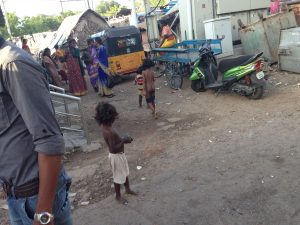 I could not process the poverty that I was seeing. I could not understand how a group of people could live under these conditions. I could not understand how children could be subjected to this level of poverty.
I could not process the poverty that I was seeing. I could not understand how a group of people could live under these conditions. I could not understand how children could be subjected to this level of poverty.
When we arrived at the church, which was a concrete building about the size of my two-car garage, with no windows and of course no air conditioning. We were asked to remove our shoes before entering. I am embarrassed that we refused to remove our shoes. I had on sandals and did not want my well pedicured toes to touch the filth that was on the floor. I didn’t even want to be in that place at that moment. They were very gracious and did not insist that we remove our shoes. But out of respect we should have.
As we sat there waiting for the doctor to arrive, we once again made small talk and took pictures. We looked at each other because we could not bear to look at the faces of hopelessness that surrounded us. The longer we sat, the more I wished I had chosen to tour the city. The longer we sat, the more my faith dwindled. What could I possibly offer these people as a suburban teacher from America? Their needs were too great. Their poverty too extensive. Their health too deteriorated. It was like I was on a rollercoaster ride and in the middle, I decided I wanted to get off but couldn’t. There was nothing I could do but sit and pray for God’s grace, His love, His power, to show up because I had absolutely nothing to give.
We were asked again to remove our shoes. This time, I was prompted by the Holy Spirit to submit. So before we prayed for the first person, me and the other girl praying with me, took off our shoes. The third woman who had come with us was asked to dispense medicine and was no longer sitting with us.
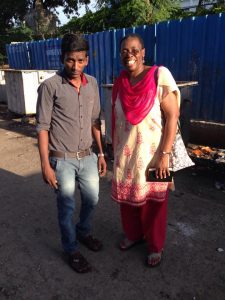 I was surprised that they allowed the children to go before the adults. Our interpreter stepped out of the room for a moment and we were trying to understand the prayer request of the first little girl. One of the church workers came over and tried to help us interpret. He we a handsome, extremely thin young man with a very sweet spirit. We prayed for the children. They said they felt better but we were not sure.
I was surprised that they allowed the children to go before the adults. Our interpreter stepped out of the room for a moment and we were trying to understand the prayer request of the first little girl. One of the church workers came over and tried to help us interpret. He we a handsome, extremely thin young man with a very sweet spirit. We prayed for the children. They said they felt better but we were not sure.
Then this precious woman came for prayer. Her eyes were full of sorrow; her body full of pain. By this time our interpreter had returned and this woman was able to tell us her woes via the translator. She had pain in her body and was experiencing light-headedness. We prayed. She felt slightly better so we prayed again. She stood up to walk away, but I said, “Wait. Let’s pray until you are completely healed.” The interpreter then informed me that she was in fact completely healed. Her pains were gone, she was not longer light-headed. I think I was more surprised than she was. We gave the Lord a shout of praise and thanked him for what he had done.
The next woman sat down for prayer. I asked “what was her trouble?” She began to tell us one by one what was
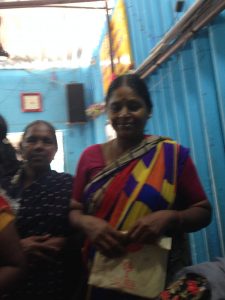
bothering her. One by one we prayed for each ailment. One by one she was healed. While we were praying for her, she began to yell out, “Jesus” in her native language. After she was completely healed, she told us through the interpreter, “I am a Hindu but today, I was touched by the power of Jesus.” The interpreter later told us that before that moment, this Hindu woman would never even say the name of Jesus and wanted nothing to do with Christianity. She did not even believe the woman prior to her had been healed. But God allowed her to feel the sweet, healing power of Jesus and her tongue confessed.
I wanted to get up and dance but we had many more people to pray for that day. Two suburban women from the US prayed for many people that afternoon. We saw eyesight improved, and bodies healed. We loved people, prayed blessings over them, stood in agreement for the sprits of alcoholism and poverty to be broken in their lives. We prayed for marriages, houses, and justice for the unjustly punished. We even cast out an unclean spirit from a woman. At the end we prayed prophetically for the staff of the clinic including the nice young man who had helped us interpret.
That hot afternoon, on the other side of the world, amidst extreme poverty in a hot unventilated small church building, God reminded me of three simple yet profound Christian truths about my identity in Him:
- What I have in abundance, what I can always freely give away, what the world needs most is the love of God. This is our greatest and most precious commodity. God loves us extravagantly. He lavishly pours out His love upon us without limit, without bound. He asks us to love others with the same endless, infinite love.
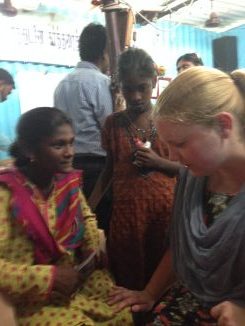 What does love look like? Love sacrifices our comfort, our needs, and our desires for others. Love is dressing in hot, uncomfortable clothing to respect cultural differences. Yes, love is walking barefoot on a dirty church floor when asked. Love is enduring pictures because the natives have never seen people from the other side of the world. Love is praying with someone until you are exhausted. Love is standing in the gap with someone and hoping for them when their hope is gone. Love is holding hands and crying together, believing together, rejoicing together. Love transcends poverty, race, language, religion.
What does love look like? Love sacrifices our comfort, our needs, and our desires for others. Love is dressing in hot, uncomfortable clothing to respect cultural differences. Yes, love is walking barefoot on a dirty church floor when asked. Love is enduring pictures because the natives have never seen people from the other side of the world. Love is praying with someone until you are exhausted. Love is standing in the gap with someone and hoping for them when their hope is gone. Love is holding hands and crying together, believing together, rejoicing together. Love transcends poverty, race, language, religion.
If you believe the situation in our country is beyond repair, if you believe there is nothing that you can do to solve the plethora of problems that face our nation, I remind you that you have an ample supply of God’s love within you. I encourage you as God is encouraging me, to begin to give it away freely, lavishly. God is calling us to demonstrate the love of God to children, the poor, the elderly, the mentally or physically challenged, the abused, the imprisoned, the sinful and the homeless. Not as a project. No one wants to be your project. But love like God loves, relationally. Freely you have received the love of God. Freely give it away.
- The same resurrection power that raised Jesus from the dead, lives within me and every Christian. The world needs a demonstration of the power of God as much as it needs to know the love of God. We owe the world a demonstration of God’s love through healing. The physical conditions of the people in this far away country were despicable. As middle-class Americans, we take access to doctors, dentist, clean water, and nutrition for granted. But for so many, this is a luxury. What I found in this country was that diabetes, heart disease, and random aches and pains were rampant.
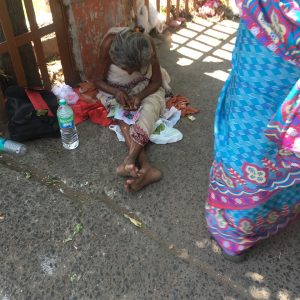 Praying for the sick and seeing them recover, is not a luxury given to a select few. Jesus said these signs shall follow those who believe, they shall lay hands on the sick and they shall recover. It is a privilege given to all who believe. Do you believe? We have been given authority over all of the works of the enemy. He comes to kill, steal, and destroy. Sickness kills, it steals dreams and it destroys families. We have authority over this as believers.
Praying for the sick and seeing them recover, is not a luxury given to a select few. Jesus said these signs shall follow those who believe, they shall lay hands on the sick and they shall recover. It is a privilege given to all who believe. Do you believe? We have been given authority over all of the works of the enemy. He comes to kill, steal, and destroy. Sickness kills, it steals dreams and it destroys families. We have authority over this as believers.
The world needs to know that God is still our healer. Just as that dear Hindu woman experienced, ever person needs to experience a touch by the power of Jesus. We owe the world this experience. We can freely give away the healing power of Jesus to a dying world. Let us begin to pray for the sick around us with expectation. Let our first response to any sign of sickness in our body or others be, let’s pray. Let’s take authority over sickness, disease, and infirmities and begin to freely and lavishly give away God’s health to those around us and then to the world.
Every person we prayed for that day was not healed. The woman who had no movement in right hand, the man who had suffered a stroke and could not move his right side, and the woman who could not walk were not healed immediately. Those faces and stories haunt me. My heart breaks for each person who walked away without an immediate healing. I wanted to see them all whole. But I cannot allow those instances to dictate my theology. The bible says, as a believer, I will lay hands on the sick and they will recover. So I choose to believe His word. I am determined more than ever to pray for the sick, to take authority over the works of the enemy, and to believe every sickness, every infirmity, and every disease was nailed to the cross 2000 years ago and is now an illegal squatter in our bodies.
- I can share my story because the poor needs the gospel preached to them. Can I share something with you that is going to challenge your theology? There is no record in the New Testament of Jesus feeding the poor. When Jesus fed the crowds of 5000 and the crowds of the 4000, there is no indication that these people were poor. They were so hungry for the word of God that they had sojourned with Jesus until their food was depleted. The disciples’ solution was to send them away so that they could go into town and buy food. This indicates that they had the means to buy food. (I am not suggesting that we should not feed the poor. God has called us to demonstrate His love in practical ways. But feeding the poor without preaching the gospel is a temporary solution.)
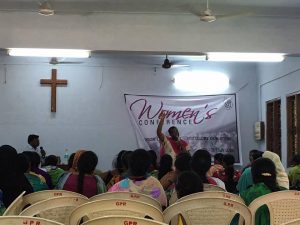
But do you know what Jesus’ response to poverty was? To preach the gospel. When John the Baptist was imprisoned and he wanted to know if Jesus was truly the Messiah, Jesus replied, “Go back and report to John what you hear and see: The blind receive sight, the lame walk, those who have leprosy are cleansed, the deaf hear, the dead are raised, and the good news is proclaimed to the poor.” (Matthew 11:4 & 5 NIV). Each miracle Jesus listed was a solution to a problem. Seeing is a solution to blindness, hearing is a solution to deafness. So what is the solution to poverty? The Good News.
The good news is this, “We were alienated from God. Jesus came to restore our fellowship with the Father by carrying our sins, our griefs, our sorrows, our disease, and our pains to the cross (Isaiah 53:4&5). Now we are adopted sons and daughters (Romans 8:15) who can experience life abundantly (John 10:10). Because of the atoning work of the cross, I can now have joy, peace, hope, love, and health. I can prosper in my emotions, my job and in my relationships. My identity as a son and daughter, has been restored.” This is the good news. This is what God has called us to share. This is the news that will elevate people above their circumstances, above their past, and lift them from a life of poverty.
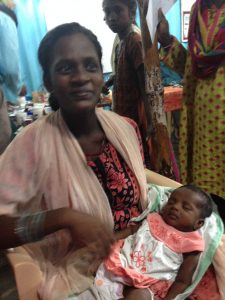 God is calling each of us to preach the gospel. That does not mean that you must be a pastor or ever speak in a pulpit. But you can share your story with friends, family and strangers. What has God done for you? The bible says “let the redeemed of the Lord tell their story, those he redeemed from the hand of the foe.”(Psalm 107:2) Tell you story. Tell what God has done for you to everyone you meet. This is the good news that will elevate and bring hope to the poor.
God is calling each of us to preach the gospel. That does not mean that you must be a pastor or ever speak in a pulpit. But you can share your story with friends, family and strangers. What has God done for you? The bible says “let the redeemed of the Lord tell their story, those he redeemed from the hand of the foe.”(Psalm 107:2) Tell you story. Tell what God has done for you to everyone you meet. This is the good news that will elevate and bring hope to the poor.
As I return to the routine of my life, I have a renewed mandate from God – to love, to heal, to preach. This is the call of God on my life. My heart aches for the poor, the disenfranchised, the hurting, and the hungry. Yes, even in America the problems seem hopeless and intimidating for a suburban, middle class, High School teacher to tackle. But now, I no longer feel hopeless; my faith is not dwindling as I survey the many problems facing me because I am equipped with a revelation of God’s love and I am determined to freely give away His love to the poor and hurting. I know that resurrection power dwells within me and I have authority over the enemy, so I will lay hands on the sick and they will recover. I will see the lame walk, the blind see, the deaf hear, and the captives set free. And yes. I will preach the gospel! I will tell my story. I will proclaim throughout this earth that Jesus is my Lord, my Savior, my Healer, my provider. I will extol of His goodness and His mercy everywhere I go!
My friends, don’t believe the lie that you have nothing to give or you have nothing to offer to this dying world. You have the Spirit of a powerful, almighty, all consuming God living within you. He is gently nudging you today, “Give Me away. Love beyond your borders. Pray outside your comfort zone. Proclaim My goodness to the ends of the earth. You will make a difference. You will change your world as you love, heal, and preach!”
Brothers and sisters, this is my mandate. This is my call – Love, Heal, Preach. Will you join me?
